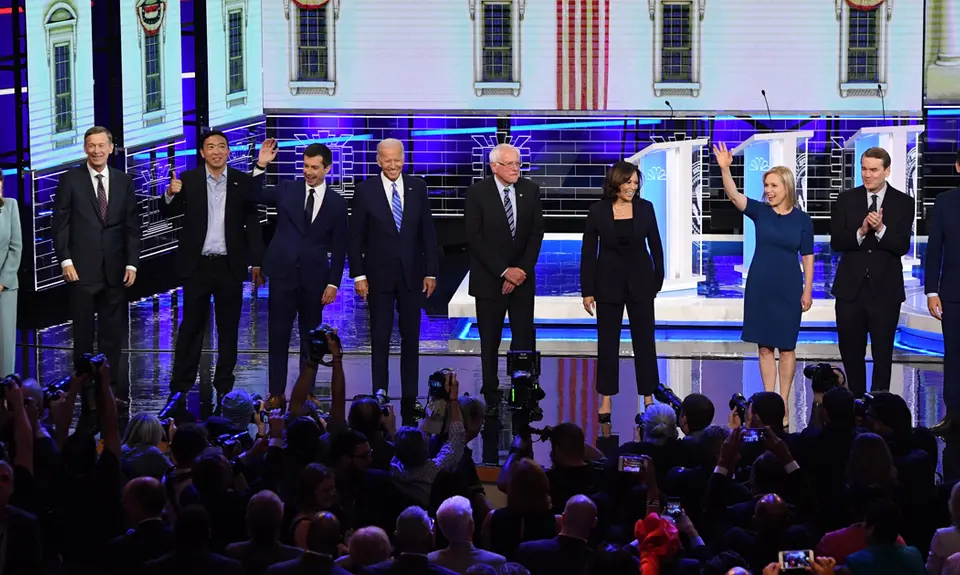Throughout both nights of the second round of Democratic primary debates on July 30 and 31, every candidate admonished the Trump administration for wreaking havoc on our democracy and pressed for measures that protected the interest of all of us over those of the wealthy and powerful. Whether the issue is money in politics, health care or choice, candidates spoke up about their plans to mitigate the erosion of our constitutional values and rights—and courts play a vital role in all those areas.
One central point of the second debate was health care reform. The candidates discussed their individual plans to improve on existing health care protections. Despite differences in the plans, the general consensus was that action was required to create a more equitable system and repair the damage from Trump’s efforts to repeal the Affordable Care Act (ACA). If the Trump administration were successful, 20 million people would lose health insurance, disproportionately affecting those from low-income communities. The ACA expanded Medicaid eligibility to cover those at or below 138% of the federal poverty level. Since then, 36 states and D.C. have received government funding to cover those costs; without it, many states will be unable to continue this coverage, which would leave millions of low-income people without adequate insurance.
[embed]https://twitter.com/peoplefor/status/1156725622913286144?s=20[/embed]
As candidates addressed their solutions to protect and expand affordable health care, Sen. Cory Booker, D-N.J., contextualized efforts to save the ACA as a courts issue: “There’s a court case working through the system that’s going to gut the Affordable Care Act and actually gut protections on pre-existing conditions.” Sen. Booker and Sen. Elizabeth Warren, D-Mass., both pushed back on the false narrative that Democrats are “trying to take health care” when it’s the Republicans who have tried for years to repeal the ACA. Without fair-minded judges on the bench, Trump’s narrow-minded elitist judges could help make the dangerous prospect a reality.
Although gender equity issues were notably absent from the first night of the debate, South Bend, Indiana Mayor Pete Buttigieg stressed the urgency of protecting abortion rights in his opening comments. The following night, Sen. Kamala Harris, D-Calif., and Andrew Yang discussed the importance of fighting for equal pay. Yang noted his experience in the business world and acknowledged that women have unique obstacles to overcome and are still paid less than men. Sen. Harris said she would “require corporations to post on their website whether they are paying women equally for equal work” and emphasized that they would be fined if they failed to do so. Sen. Kristen Gillibrand, D-N.Y., voiced her support for accessible and affordable child care for working mothers, stating that “we want to make sure women have every opportunity in the workplace.” Former Vice President Joe Biden, D-Del., outlined his work for women’s rights, pointing out that he wrote the Violence Against Women Act and fought for equal pay amendments like the Lilly Ledbetter Fair Pay Act.
On these issues, too, judges have had an impact on laws that promote fair pay and secure abortion rights. The Ledbetter Act was in response to a decision by far-right Supreme Court justices weakening protections against pay discrimination. And Trump has been picking judges with records opposing abortion rights. But fair-minded judges have been playing a role, too. In March, a federal judge ordered the Trump administration to reinstate a rule that requires companies to report employee salary data by race and gender. And in July, judges in Arkansas and Ohio have blocked extreme early abortion ban legislation in their states.
Candidates also spoke to money in politics, an issue at the root of Trump’s judicial takeover that the Supreme Court decision made possible. Ever since the Supreme Court removed restrictions on independent spending on elections in Citizens United v. FEC (2010), the health of our democracy has been in increasing jeopardy. This decision has taken the power away from the people and placed it into the hands of the top one percent. Spending from outside groups has increased exponentially in recent years, and the powerful and wealthy are driving the political agenda and disregarding the needs of ordinary Americans. During the debate, Sen. Warren and Mayor Buttigieg addressed this corruption and advocated to “amend the Constitution if necessary to clear up Citizens United,” which is the objective of the Democracy for All amendment.
[embed]https://twitter.com/peoplefor/status/1156375931772121088[/embed]
Candidates also addressed climate change and outlined steps they would take to mitigate the damage done by big corporations that threatens our safety and our future. Sen. Bernie Sanders, D-Vt., vehemently stated his contempt for fossil fuel companies comparing their work to “criminal activity that cannot be allowed to continue.” Gov. Jay Inslee also reiterated his commitment to protecting our climate during the debate, saying, “Our house is on fire. We have to stop using coal in 10 years, and we need a president to do it or it won’t get done.” Gov. Steve Bullock emphasized that the climate crisis is further perpetuated by the refusal of Republicans to acknowledge its existence citing “the corrupting influence of money” as the reason. Right now, too many Trump-nominated judges with startling anti-environment records are being confirmed. And as the rate of climate change continues to escalate at a dangerous pace, judges who are committed to protecting our planet and our wellbeing are essential.
[embed]https://twitter.com/peoplefor/status/1156741229469736960?s=20[/embed]
The courts are vital in the fight for our democracy, our safety and our rights. We need judges who are committed to being fair and just—and presidential candidates who know and prioritize this.
